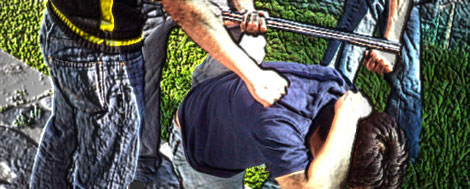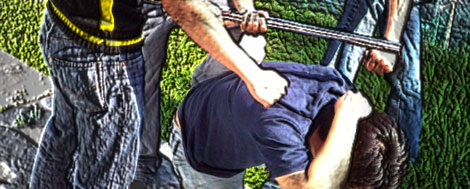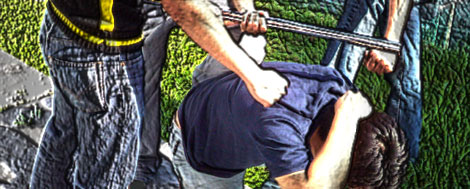There is a word the Thais use - when they want you to think of them as male, at any rate - they spell it "krub" when they use the Latin alphabet, but when they say it, they slur it. It comes out like "cop." It's one of the smallest words in the Thai language, and they use it all the time. It has no specific meaning. It just connotes politeness and good will. For the first year that I knew him, one man said only one word to me, "Cop," very quietly, instead of hello. "Cop" instead of goodbye, "cop" instead of excuse me or yes. He was always very pleasant, very polite, very cheerful, and virtually silent. He's quite young, small, trim, with large eyes and black hair that he brushes straight back from his face, which makes him look like an anthropomorphised version of a character from Cats.

"My friend's name is Nung," Bong said.
"Cop," said Nung, very quietly, smiling shyly at his toes.
Which is why I was so surprised, one night in the sauna a year later, when his towel began its slow and deliberate trek south, opening up regions for exploration and development that people in this part of the world generally preserve. Recently, he's become very eager to engage men sexually. But he's still not into conversation.
I asked him if any of his friends or anyone in his family knew he were gay. No. "If they knew I was ---, they might have� feelings."
I can't help but feel a bit sorry for him. In his desire to please the people he cares about, he has to hide an important part of who he is. He has been pressed into a corner by the need to hide his sexuality. He has no way to talk about it, and he is so reticent to reveal himself that his gay life, as far as I can tell, is limited to occasional furtive sex in the health club. To my mind, there's nothing wrong with casual sex in public places, but there's much more to being gay than that, things that come with intimacy, and companionship, and a sense of belonging to a community, the things that help make a person comfortable being different. Sadly, fear can destroy this experience for many. The pressures that keep people living in their "cages", are forms of violence. They're subtle, but still oppressive and soul-deadening.
The same thing happens in the west. A friend of mine in California found out her husband was gay one New Year's Eve when he told her he was taking the car off for an early-morning tune up. The day passed without so much as a smoke signal, until shortly before midnight she got a call from the county lock-up; he'd been arrested for soliciting for sex in a public restroom. "Getting my oil changed" now has a completely different meaning.
(Nung's name isn't really Nung. I've changed it to protect his privacy. I have no idea what his real name is, because most folks here go by nick-names. Nung isn't his real nickname, either.)
The same thing happens, but for different reasons. Fear of different forms of violence plays a role in many gay lives, but the fears in Asia and the fears in the West are different. This has to do with the ways that people think about "us" and "them." There are lots of ways to divide us from them, and sometimes the categories overlap in complicated and strange patterns that lead to different kinds of violence, and different interpretations.

Gays also die bloody deaths in Thailand. To some extent, violence against transvestites is acceptable. But here, if it makes the papers, it's usually for the sake of titillation. One Bangkok paper seems to specialise in photos of corpses. There's a body on the front page almost every day, and if it's the body of a man in a dress, all the better for sales. In Thailand, transvestites aren't usually objects of sympathy. We're still "them".
Here's a big generalization: the US (and most of the west) runs on laws, while Thailand (and most of Asia) runs on family and personal connections. It's not entirely true, of course; Thailand has laws and the US has families, but overall, what the law says has more sway with Americans, and what your mom says has more sway with Asians. That means that Americans are more likely to think of themselves, and their sexually, in terms of individual rights. Right now, American law, as well as American churches and American television programs and movies, are getting keener the rights of homosexuals. There was a recent decision in the Presbyterian Church in the US to move forward with a plan to allow gays and lesbians to hold any and all church offices. They're saying that we aren't deviant, we aren't breaking God's law, and so we deserve the right to serve God in the capacity of our choice.
Not long ago, there was a voter proposition on the ballot in California that would have made it illegal for teachers to act as though they weren't condemning homosexuality when they talked about it. It went down to defeat, fortunately, but before it did activists from across the state cried that gay bashings would rise if people saw that it was OK to stigmatise gays. The ways Americans have of talking about gays in terms of rights puts the focus on the ways people's legal rights are violated - and the best stories for TV and the papers are always the clearest.
In Asia, it's different. Thailand is unlike many countries in the region in that there are no laws directly persecuting homosexuals. But there are no laws protecting or supporting us, either. Don, an executive in the shipping industry, recently changed jobs. He had a new position he liked, he told me, but several weeks later, he quit. He had to. The office insisted that he pass an HIV test before they would hire him permanently. This was a test he can't pass and couldn't fake, so he bowed out quietly and went to look for work elsewhere. There are no protections for him in the workplace, and no one to demand them for him here.

One man I know once tried to date an Asian guy with big concerns about being found out by his high society family. He broke it off, though, when it became clear that the potential boyfriend would only come by at 2 a.m. for quick sex before heading home to bed. There was no chance for a relationship to mature, and that meant that there was no really good way for the guy to mature as a gay man, either. And that means that he probably won't have a chance to come to accept his sexuality enough to be open about it, and that means that he may live and die embarrassed in the closet.
So which is better: being beaten on the street, or being ostracized from the family? Do you want your rights respected as an individual, or do you want to get along as a good son, granddaughter, nephew, wife? It's a false choice, of course. It's not either-or, east vs. west. We all play multiple roles and makes choices based on different the different roles we play. Times are changing, but they change slowly, and we're still waiting, to some extent or other, to come in from the outside.
So what is Nung supposed to do? Hopefully, he'll find a safe place to explore his sexuality and become comfortable with himself - at least comfortable enough to call himself "gay" out loud. Maybe he'll find a boyfriend who can teach him. Maybe he'll be outed to his parents and find they accept him. Whatever the case, it's important for him to understand - and for the rest of us to understand as well - the kinds of violence that hold us back, and, for those of us who can, to look for solutions.











 打印版本
打印版本










读者回应
抢先发表第一个回应吧!
请先登入再使用此功能。